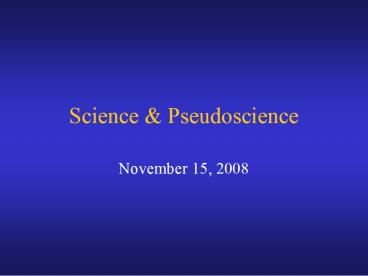Science PowerPoint PPT Presentation
1 / 22
Title: Science
1
Science Pseudoscience
- November 15, 2008
2
A scientific, B pseudoscientific, C
neither, D dont know
1. Creation Science 2. Evolutionary Theory 3. As
trology 4. Literary Analysis 5. Homeopathy 6.
Physics 7. Acupuncture 8. Sociology 9. Chiropra
ctic Medicine 10. Dentistry
11. Voodoo 12. String Theory 13. Psychology 14.
Psychoanalysis 15. Chemical Engineering 16. M
athematics 17. Theology 18. Scientology 19. As
tronomy 20. History
3
Popper on Demarcation
- Troubled by theories that are too-easily
confirmed. - This leads him to his main ideas
- 1. Confirmation is easytoo easy.
- 2. So, confirmation counts only if it is
riskythis happens when a theory passes an
attempt to falsify it. - 3. Thus, good scientific theories eliminate a
lot of possibilitiesthis makes risky
confirmation possible.
4
Poppers Demarcation Criterion
A theory is scientific if and only if it is
falsifiable.
Objection any theory is falsifiable with ad hoc
assumptions. Response the more ad hoc assumpti
ons, the less scientific.
5
Poppers Demarcation Criterion
A theory is scientific if and only if it is
falsifiable.
Objection any theory is falsifiable with ad hoc
assumptions. Response the more ad hoc assumpti
ons, the less scientific.
6
Godfrey-Smith on Demarcation
A way of handling an idea is scientific if and
only if it exposes the idea to risk.
7
Godfrey-Smith on Demarcation
A way of handling an idea is scientific if and
only if it exposes the idea to risk.
Thus, ideas like Marxism, Creation Science, and
Freudian psychoanalysis can have scientific and
unscientific handlings. Similarly, the theory of
evolution, and quantum mechanics can have
scientific and unscientific handlings.
8
Lakatos on Demarcation
PROPOSAL Scientific theories are those that are
proven.
LAKATOS No. One can today easily demonstrate
that there can be no valid derivation of a law of
nature from any finite number of facts (21)
If prove means to logically deduce, then all t
heories are equally unproven.
9
Lakatos on Demarcation
PROPOSAL Scientific theories are those with high
probability.
LAKATOS No. But, in 1934, Karl Popperargued
that the mathematical probability of all
theories, scientific or pseudoscientific, given
any amount of evidence is zero. (22)
10
Lakatos on Demarcation
PROPOSAL Scientific theories are theories for
which there is a critical experiment .
- Scientific theories are falsifiable. (Popper)
- Scientific theories are those for which the
scientists specifies a crucial experiment.
(Godfrey-Smith)
LAKATOS No. Poppers criterion ignores the
remarkable tenacity of scientific theories.
Scientists have thick skins. They do not abandon
a theory merely because facts contradict it. (23)
11
Lakatos on Demarcation
PROPOSAL Scientific theories are theories for
which there is a critical experiment .
- Scientific theories are falsifiable. (Popper)
- Scientific theories are those for which the
scientists specifies a crucial experiment.
(Godfrey-Smith)
LAKATOS No. Poppers criterion ignores the
remarkable tenacity of scientific theories.
Scientists have thick skins. They do not abandon
a theory merely because facts contradict it. (23)
12
Lakatoss Proposal
The unit of assessment is not a theory or a
method, but a RESEARCH PROGRAMME.
What is a RESEARCH PROGRAMME? 1. Hard Core
(e.g., Newtons Laws) 2. Protective Belt Auxi
liary Hypotheses (e.g., that telescopes are
accurate) 3. Heuristic Problem-Solving Machine
ry/Methods (e.g., mathematical techniques like
integration)
13
Lakatoss Proposal
A research programme is scientific if and only if
it successfully predicts novel facts.
14
Example Halleys Comet
15
Example Eddingtons Test of Relativity
16
Lakatoss Proposal
A research programme is scientific if and only if
it successfully predicts novel facts.
17
Lakatoss Proposal
A research programme is scientific if and only if
it successfully predicts novel facts.
18
Lakatoss Proposal
A research programme is scientific if and only if
it successfully predicts novel facts.
In degenerating research programmes, facts are
only accommodated, they are not predicted.
19
Lakatoss Proposal
Comparisons To Popper Popper concerned with the
possibility of decisive falsification. Lakatos
rejects the idea of decisive falsification and
wants success, not just possibility of success.
Popper emphasizes riskiness and boldness. To have
a successful novel prediction, a research
programme must be bold and risky.
Comparisons To Godfrey-Smith Godfrey-Smith empha
sizes the kind of method, and not the results.
Lakatos emphasizes the ability to produce certain
results (novel prediction). But both emphasize th
e need to focus not just on theories.
20
Question about Lakatos
A research programme is scientific if and only if
it successfully predicts novel facts.
What really count are dramatic, unexpected,
stunning predictions a few of them are enough to
tilt the balance
Q Why is there a difference between a research
programme that makes novel predictions and one
that only accommodates?
Q Is novel prediction what makes a research
programme scientific, or is it evidence that the
research programme is doing something right?
21
Question about Lakatos
A research programme is scientific if and only if
it successfully predicts novel facts.
What is it to be a murderer? PROPOSAL A person
is a murderer if and only if that persons DNA or
fingerprints are on the murder weapon.
This might correctly classify murderers from non
-murderers, but does it tell us what it is to be
a murderer?
22
Summary
POPPER
A theory is scientific if and only if it is
falsifiable.
GODFREY-SMITH
A way of handling an idea is scientific if and
only if it exposes the idea to risk.
LAKATOS
A research programme is scientific if and only if
it successfully predicts novel facts.

